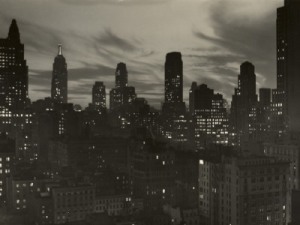The best novels are carefully and elaborately constructed deceptions, which reveal a detailed, expansive and consistent version of the truth. The Night Watch by Sarah Waters is such a book and one of the finest and most bitter novels of this century. The artful blending of distinct narratives which describe the unravelling of a society that Petronius accomplished with so much heart in The Satyricon, might compare with Waters’ account of London during and shortly after the Blitz, but Waters has none of Petronius’s picaresque cheerfulness and humour: unlike the fragmented Satyricon, the bridges between the narrative segments of this novel are subtle but sturdy and by this device are brought across the small bits of information which tend to enhance and shade the separate narratives in what might otherwise be too loosely connected.
The first time I finished reading The Night Watch I didn’t close it: instead I went back to the very first page and began reading it all over again. It is this unforgettable first page which has stuck with me all these years. The most remarkably memorable works enter us in a way which deftly bypasses our critical faculties. This is magic at its best. Without this singular element, books are bad, or unimpressive, or merely good: we might stand on solid ground and see the characters going about their business on a visible surface, but we do not feel the curve of the earth or the forces beneath their feet, the hidden strata, the underground streams and certainly not the tectonic plates. In the months after I read this book, I attempted several times to analyse it, but every time I began, I found I couldn’t go on. I could never find the clarity I needed to sort out its elements in a way that made sense. With my second reading, I had the chronology down, and recognised the hints and prefigurings of one section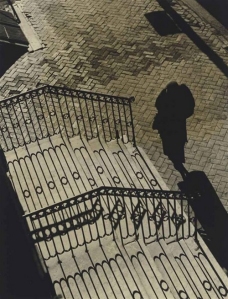 hidden in another. But a third reading was required before I was finally able to put my finger on the key that had eluded me before. The sense within it defied me until I had read the book two more times.
hidden in another. But a third reading was required before I was finally able to put my finger on the key that had eluded me before. The sense within it defied me until I had read the book two more times.
Waters’ bag of writerly tricks includes an inordinate profligacy of sensuous detail, a pitch-perfect ear for dialogue, and the casual perfection of her writing itself. Everything is fresh, right down to the coruscating horror of war-ravaged London. Waters’ movable structure, in reverse chronology and with its segments of overlapping narratives, pivots on a single axis like a live insect spinning on its pin even as it is fixed to the wax board, but the careful skirting of that impairment, the loss of memory, compels us to sleuth for context. When Kay tells her friend Micky “I’ve got lost in the rubble… couldn’t get over it” we might conclude that she is remembering the break with her lover Helen. But the forfeiture of memory is a serious casualty in The Night Watch. It means the excision of an interior space which gives people substance, and it makes for a sense of deep disquiet. We all become dedicated drunks when we dream every night. We go places and do things which are shameful, startling, frightening, embarrassing or ill-advised, and when we wake up we don’t remember them, but nonetheless we feel them, and some residue of the world we inhabited while we slept remains. It can be conjured up in the way we recall an old tune we haven’t heard in years, or the way in which a touch can set off a physical memory. This absence more than anything else amplifies the emptiness in and around Kay. It cuts a swath through her 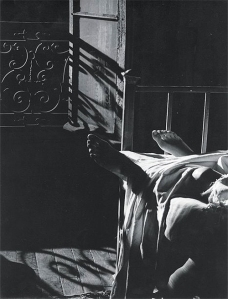 personality, because we are prevented from seeing inside her, even to the extent of having a tissue of a dream. Kay’s life is not so much a life as an afterlife: we stay in the present, we move forwards into a past, which we then have to extrapolate and insert into the puzzle, but there is nowhere that the pieces are permitted to rest in their proper place and in this respect, The Night Watch resists a satisfactory disambiguation.
personality, because we are prevented from seeing inside her, even to the extent of having a tissue of a dream. Kay’s life is not so much a life as an afterlife: we stay in the present, we move forwards into a past, which we then have to extrapolate and insert into the puzzle, but there is nowhere that the pieces are permitted to rest in their proper place and in this respect, The Night Watch resists a satisfactory disambiguation.
Kay Langrish, one of the characters in the dyads and triads around which The Night Watch takes shape, and significantly the one with whom Waters begins her book, stands out for me as the main character in this novel. She is at its heart and soul. Her story demands more attention than all the rest.The other segments of the book seem to be present in a supporting role but Kay is the vanishing point that gives the whole novel its sense of perspective. The distant secondariness of the other dyads were for me like the names one sees skimming by after the movie has ended. We feel they should not be ignored, that we ought to read them if only to recognise the hard work and talent and dedication that helped make the movie possible, but nevertheless they seldom command our attention: we just don’t care that much. I did not feel compelled by the other two narratives. I recognised that they supported the novel in important ways, but they lacked suspense, and I could find no inducement to focus on them very much. I did care about the Kay/Helen/Julia story. It caught my attention and held it with the kind of buzzing insistence of a headache which demands the pressure of hands in order to suppress its throbbing compulsion.
When we find her at the beginning of the book, Kay is a ruin. Our eyes skim over the carefully faceted details of her little upstairs-room – no books, clothes hanging on a wire, darned socks, cold-water bathroom down the hall, a sour smelling bed – all instantly register as amounting to appalling conditions and decidedly at odds with our instinctive sense of who this cha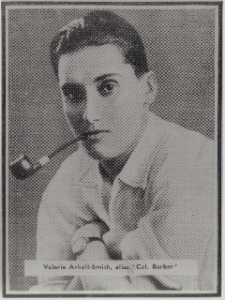 racter is. We feel the instant disconnect suggested by Waters, with something we cannot really place. We know Kay was not always like this, that she was not always accustomed to squalor and apparent, self-imposed impoverishment.
racter is. We feel the instant disconnect suggested by Waters, with something we cannot really place. We know Kay was not always like this, that she was not always accustomed to squalor and apparent, self-imposed impoverishment.
The third September after the war – September of 1948 – finds Kay unable to adjust to a post-war existence. She no longer wears her uniform and a tin hat, no longer drives an ambulance, no longer has a purpose in life. Old-maidish Mr. Mundy, a character in another segment, rather unflattering refers to Kay as ‘Colonel Barker’, but for Mr. Mundy’s young gay protégée Duncan, ‘the bold cut of her hair, her mannish clothes, her sharp, distinguished-looking profile’ makes him think ‘she might once have been a lady pilot, a sergeant in the WAAF’. She looked to him ‘like a handsome young man.’ It is a profound irony that the littered externalisation of Kay’s dreariness and fatigue lies inescapably reflected all around her. She herself is out of step, out of sequence. She prefers to watch the second part of a movie before the first: she engages in a tawdry grope and kiss with a tipsy girl in a cinema restroom: she seems to try to pick up strangers on her walks, and on an occasion buys a blond girl a drink in a bar. All this is so far removed from the way she was before, when she would have spurned such crumbs as these out of hand when she was intact, and more than equal to the challenge of driving an ambulance through the pitch-dark streets 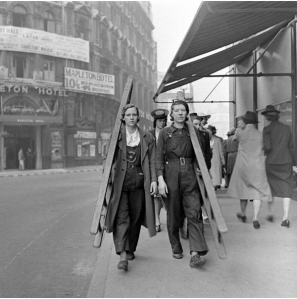 during the black-out. Then she had been able to face danger and horror, as when she and her friend Micky extricated the body of a woman who had been tossed by an explosion and impaled on a railing. She stamped out the stray fires caused by incendiary bombs and braved the bombs themselves to rescue strangers. Her senses were fully alive to the significance of the things she saw in the ruins – the glimpse of a box decorated with painted shells seen in the rubble – most likely a child’s handwork project – a small jawbone still embedded with the eruptions of its first new teeth – and no doubt she took in the hidden shape of the unseen world beneath its chaotic surface, and always managed to respond to tragedy and exigency in the right way at the right time with the gift of her ever fully present self.
during the black-out. Then she had been able to face danger and horror, as when she and her friend Micky extricated the body of a woman who had been tossed by an explosion and impaled on a railing. She stamped out the stray fires caused by incendiary bombs and braved the bombs themselves to rescue strangers. Her senses were fully alive to the significance of the things she saw in the ruins – the glimpse of a box decorated with painted shells seen in the rubble – most likely a child’s handwork project – a small jawbone still embedded with the eruptions of its first new teeth – and no doubt she took in the hidden shape of the unseen world beneath its chaotic surface, and always managed to respond to tragedy and exigency in the right way at the right time with the gift of her ever fully present self.
One’s ear picks up the faint crepitations of Kay’s former life from which the present is a fall from grace. We know something terrible has already happened. We sense a past of strength, and of refinement even, and we feel as if we are watching the impeccable cuff of a shirt being dipped in grime. Something has happen to Kay which is so devastating, so fell, that she has been plunged into an interiority which has detached her completely from the outside world, even as she compulsively moves around in it and minutely observes it. Life has taken on a tinge of unreality, that seems to make everything in it go on at a distance. Nothing extends beyond the mere band of murky light that her own dullness seems to exude within the small, blear circumference surrounding her. We may rush to call it depression, but this bland and dismissive word does not begin to encompass or even describe the horror of Kay’s existence. Her ability to be a part of life, or to interact with it, disappears, while her compulsion to observe persists in the most acute manner possible. Whatever has happened to her has created a kind of insuperable severance from life and the living.
What was the distortion in Kay’s vision that caused her to idealise her lover Helen? Did Kay see potential lovers as being either virgins or whores? She was a woman of the world: the liaison, casually referred to, with a high-class prostitute who gave Kay her flat attests to a certain lack of squeamishness with regard to dissolute women, and certainly her witty comment about “the deep peace of the marital bed” compared to “the hurly-burly of the sapphic chaise lounge” shows, if nothing else, a deep sense of irony with respect to relationships. It could not be that Kay had a masculinist view of female virtue. I gave this question a great deal of thought. I wondered if Kay was in fact aware of Helen’s moral and other inadequacies: if indeed she may have picked Helen in an effort to force a happy ending out of unpromising material, in order to prove to herself that it could be done – that one could pull a pure young girl out of the ruins of the world, and that she, Kay, even as a social outsider, could aspire to and achieve a conventional domestic happiness regardless of the odds. This streak of utter conventionality in Kay’s make-up is one of the things I found naggingly inconsistent about her character. It would seem that Kay may not have loved what Helen was, but rather what she represented. It was not perception but something else, perhaps resembling recognition. The image of something already known and conceptualised in the mind is projected upon something that seems like it, or close enough. But it seems that the seeds of Kay’s dissolution were already planted in the distant past. Helen’s defection simply gave them the nourishment they
She was a woman of the world: the liaison, casually referred to, with a high-class prostitute who gave Kay her flat attests to a certain lack of squeamishness with regard to dissolute women, and certainly her witty comment about “the deep peace of the marital bed” compared to “the hurly-burly of the sapphic chaise lounge” shows, if nothing else, a deep sense of irony with respect to relationships. It could not be that Kay had a masculinist view of female virtue. I gave this question a great deal of thought. I wondered if Kay was in fact aware of Helen’s moral and other inadequacies: if indeed she may have picked Helen in an effort to force a happy ending out of unpromising material, in order to prove to herself that it could be done – that one could pull a pure young girl out of the ruins of the world, and that she, Kay, even as a social outsider, could aspire to and achieve a conventional domestic happiness regardless of the odds. This streak of utter conventionality in Kay’s make-up is one of the things I found naggingly inconsistent about her character. It would seem that Kay may not have loved what Helen was, but rather what she represented. It was not perception but something else, perhaps resembling recognition. The image of something already known and conceptualised in the mind is projected upon something that seems like it, or close enough. But it seems that the seeds of Kay’s dissolution were already planted in the distant past. Helen’s defection simply gave them the nourishment they  needed in order to flourish with an unimpeded vigour and malignity. Kay seems to sense this when she says “We never seem to love the people we ought to, I can’t think why.”
needed in order to flourish with an unimpeded vigour and malignity. Kay seems to sense this when she says “We never seem to love the people we ought to, I can’t think why.”
At first it seemed to me that Kay provided the only evidence of love, and was the only one capable of it, and of devotion and constancy and marital probity. But I cannot avoid the suggestion of a darker motivation in Kay’s choice of Helen might not have been the awareness of her own superiority. She was upper-class, she was older, she owned the flat, she may even have had access to her family’s wealth. She was certainly better situated than Helen, and in this respect the relationship between her and Helen could never have been that of equals. I wonder if Helen fell in love with Julia, Kay’s former girlfriend, because of an unconscious desire for some sort of parity between herself and Kay: there could have been for her a twisted logic in making a sexual conquest of Julia, who Helen thought had rejected Kay, and thereby securing a position for herself in winning something she thought Kay had wanted and lost. Of course Helen was wrong about everything. Julia used Helen as a pawn: Julia was under no illusion about Helen. She did not think Helen was particularly interesting, or intelligent or even beautiful. The love-triangle is operatic in the way a version of Otello would be, where Otello is an English public-school educated lesbian of impeccable probity, the villainous Desdemona a bargain-basement Greta Garbo from Worthing, and Iago an elegantly aristocratic writer of lurid detective novels, who is in fact in love with Otello and could only say of Desdemona that she ‘resembled a lovely onion.’
Julia Standing and Helen Giniver are a couple entangled in a thorny and contentious relationship which appears at times to be unravelling. Helen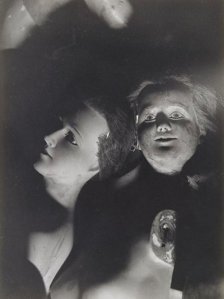 works in what might be called a Pleistocene version of a modern dating agency, and Julia works with her architect father to assess bomb damage in buildings which have not been completely destroyed and are still standing. She does this mostly on her own, and displays an astonishing sang froid about the real dangers she confronts when she enters these unstable structures, which may collapse at any moment. Helen is a middle class girl and Julia is unmistakably upper-class: her grubby working clothes gainsay it, but her speech, despite the occasional affectation of slangy locutions, clearly affirms it. Helen is attracted by Julia’s natural hauteur and elegant beauty, but also by something hidden but sensed, about Julia’s past relationship, only mentioned in passing, with Kay.
works in what might be called a Pleistocene version of a modern dating agency, and Julia works with her architect father to assess bomb damage in buildings which have not been completely destroyed and are still standing. She does this mostly on her own, and displays an astonishing sang froid about the real dangers she confronts when she enters these unstable structures, which may collapse at any moment. Helen is a middle class girl and Julia is unmistakably upper-class: her grubby working clothes gainsay it, but her speech, despite the occasional affectation of slangy locutions, clearly affirms it. Helen is attracted by Julia’s natural hauteur and elegant beauty, but also by something hidden but sensed, about Julia’s past relationship, only mentioned in passing, with Kay.
At some point the secret that Waters almost conceals within the Helen/Kay/Julia triangle and which makes it so dynamic begins to emerge. I had become distracted by the intensity of Helen’s affair with Julia, begun within three weeks of their meeting. My eye was fixed on Helen because her emotions were in such active ferment. There was a past in which Kay adored Helen: when she was almost tediously uxorious, in which she treated this chipped ceramic mug of a woman as if she were a perfect Sèvres tea-cup, and with never the slightest remonstration. Kay precisely fitted the role of the devoted ‘husband’ of an unsympathetic wife. She loved Helen, but her emotions seem to have reached a point of equilibrium. But in this past there is a triangle – Kay loves Helen loves Julia, whereas Julia who seems at worst cold and unloving, or at best simply removed, loved Kay.
 Waters does not permit her readers to probe Julia’s inner workings as she does to a limited degree with Kay and rather more so with Helen. But Julia is the key. Hidden from me at first was that Julia and not Helen, was at the apex of the triangle. Julia and Kay have much in common – their handsome good looks, their social class, but more than any thing in either the social or cultural antecedents they have in common, they share a fundamental likeness of something resembling an existential orientation, even a condition. Though Kay strives mightily to reject and extinguish such a realisation under the illusion of security provided by her relationship with Helen, both Kay and Julia are fundamentally solitary creatures who each carry an unfathomable loneliness within themselves, and for such a sense of isolation there could be no possible remedy. Even Helen notices “what is it about Julia? Why is she always alone?”
Waters does not permit her readers to probe Julia’s inner workings as she does to a limited degree with Kay and rather more so with Helen. But Julia is the key. Hidden from me at first was that Julia and not Helen, was at the apex of the triangle. Julia and Kay have much in common – their handsome good looks, their social class, but more than any thing in either the social or cultural antecedents they have in common, they share a fundamental likeness of something resembling an existential orientation, even a condition. Though Kay strives mightily to reject and extinguish such a realisation under the illusion of security provided by her relationship with Helen, both Kay and Julia are fundamentally solitary creatures who each carry an unfathomable loneliness within themselves, and for such a sense of isolation there could be no possible remedy. Even Helen notices “what is it about Julia? Why is she always alone?”
Kay and Julia are both women with vaulted interiors, each in her own way utterly inconsolable. Julia knows this about herself – but Kay believes she might be consoled. Julia, despite her apparent flintiness and her cool exterior, has also failed to adapt to her losses in the ways that she would wish. She is just as much a victim of disappointed love as Kay. Julia emerges as a character with not much feeling, without much ability or desire either to love or be loved or to connect. But what Waters hides in plain sight, is that an open secret is fully present in that upwelling of infinite sadness which we are allowed to glimpse when Julia’s tells Helen that she was in love with Kay for years. The sense of ruefulness, and chagrin, even bitterness, which surfaces in that moment when Julia tells Helen it was Kay who ended their relationship, more than suggests that Julia is still in love with Kay. This is the point at which my question about what Julia could possibly have seen in Helen begins to be answered. Julia admits to Helen that she (Julia) began her pursuit of Helen in order to see what Kay saw in Helen. But it was more than that.
The obvious explanation here, is that Julia wanted to get back at Kay for Kay’s rejection, but it seems rather that she wanted to reach Kay by a sort of proxy. How difficult to accept that ‘misaffection’ (but not disaffection – Kay’s very intelligent and subtle distinction.) Helen was the closest Julia could get to Kay, and rather than being pleased to give Kay some of her own back, it seems more likely that Julia was deeply conflicted. She must have known, even as her involvement with Helen deepened, that she had permitted impulse to lead her into a situation not of her choosing or desiring, with a woman she did not and could not ever love. In seeking to be free of Kay and taking up with Helen, Julia appears to have renounced the received standards of behaviour of her class as well as its tacit protocols, but she is never quite free of them, as evidenced by her shocked disapproval of Helen’s lapses from propriety, as when Helen eavesdrops on the sordid conversations of the squabbling tenants in the basement apartment below them. Kay might have been able to overlook or even transcend the difference in class and upbringing between herself and Helen, but Julia, despite her best efforts, never could.
of proxy. How difficult to accept that ‘misaffection’ (but not disaffection – Kay’s very intelligent and subtle distinction.) Helen was the closest Julia could get to Kay, and rather than being pleased to give Kay some of her own back, it seems more likely that Julia was deeply conflicted. She must have known, even as her involvement with Helen deepened, that she had permitted impulse to lead her into a situation not of her choosing or desiring, with a woman she did not and could not ever love. In seeking to be free of Kay and taking up with Helen, Julia appears to have renounced the received standards of behaviour of her class as well as its tacit protocols, but she is never quite free of them, as evidenced by her shocked disapproval of Helen’s lapses from propriety, as when Helen eavesdrops on the sordid conversations of the squabbling tenants in the basement apartment below them. Kay might have been able to overlook or even transcend the difference in class and upbringing between herself and Helen, but Julia, despite her best efforts, never could.
Julia gave Helen plenty of cause for jealous suspicions about Julia’s involvement with other women, or rather with another woman, Ursula Waring, and Helen is ripe for suspicion. She has permitted her voyeuristic imagination to range over the intimacies engaged in by Kay and Julia, and perhaps she will do the same with Julia and Ursula if and when her suspicions are confirmed. It could be that Helen might have fared better with someone to knock her about and give her the excuse she needed to vent her suppressed plume of volcanic emotions. Instead she cannot prevent herself from grinding away at Julia, whose enthusiasm for their affair seems to diminish by marked degrees. Julia is withheld and hesitant – this plays well to Helen’s insecurity and her need. Helen seems to be the kind of woman who will always be the inferior in 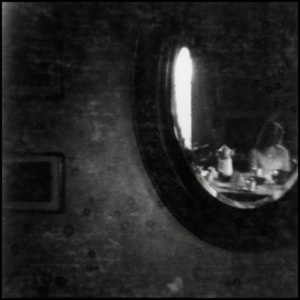 any relationship, and perhaps the origin of her splenetic rages lie in an occluded awareness of this fact. Helen’s authenticity as a character seems to come from her deficits, her youth, her class, and the inner demons of jealousy and insecurity and possessiveness that consume and torment her. There is nothing inconsistent about Helen. She is entirely of a piece. Helen has an instinct for survival. In her second miraculously narrow escape in two years, when the flat where she and Kay live is bombed, she was spending the night with Julia, and her life is saved as a result of her infidelity. What are we to make of the kernel that might be hidden within that shell?
any relationship, and perhaps the origin of her splenetic rages lie in an occluded awareness of this fact. Helen’s authenticity as a character seems to come from her deficits, her youth, her class, and the inner demons of jealousy and insecurity and possessiveness that consume and torment her. There is nothing inconsistent about Helen. She is entirely of a piece. Helen has an instinct for survival. In her second miraculously narrow escape in two years, when the flat where she and Kay live is bombed, she was spending the night with Julia, and her life is saved as a result of her infidelity. What are we to make of the kernel that might be hidden within that shell?
The troubling complexity and contrariness of human relations and human desire, their insubstantiality, and brevity, their inherent susceptibility to blight, the unresolvable nature of attraction and repulsion, of hunger and satisfaction, are all found within the bounds of this sardonic, ironic, and indeed tragic triangle. The bitter truth about relationships is that the one who wants the least comes off best. In a sense Julia is as wounded as Kay. She is certainly as lonely and as isolated. But she has come to terms with her predicament. She has a self-awareness about her suffering, whereas Kay just suffers. Julia’s accommodation of chaos and disorder, her personal slovenliness, the disorder of her flat, all suggest that in her way she had given up long before Kay. She had succumbed in the same way Kay would later on, to the loss of love. In Kay’s case love was ventured and lost, in Julia’s case, ventured but never gained. Julia cannot forget hat near miss, that relationship that just might have been: the only time she speaks of love plausibly and convincingly is in when she speaks of Kay. Julia’s wartime job repeats the symmetry of her own interior isolation found reflected in the ghosts of shattered buildings where she spends her days. To have arrived at a place after having endured our way to the end of all our disappointments and find nothing there, that might be as close to hell as it gets.
lost, in Julia’s case, ventured but never gained. Julia cannot forget hat near miss, that relationship that just might have been: the only time she speaks of love plausibly and convincingly is in when she speaks of Kay. Julia’s wartime job repeats the symmetry of her own interior isolation found reflected in the ghosts of shattered buildings where she spends her days. To have arrived at a place after having endured our way to the end of all our disappointments and find nothing there, that might be as close to hell as it gets.
Helen’s wide masochistic streak, and Julia’s coolness and detachment, her terse refusal to engage in Helen’s choleric manipulations, and the natural lack of polarity of their within-gender dynamic, spells disaster from start to finish. There can be no natural chemistry here, and the fact that Julia has any reaction at all to Helen is due, I think, in large part to the element introduced by Helen in her function as a thread connecting Julia to Kay. Helen’s insecurity will not permit her to accept love where it is given, but to desire it only where it it withheld or absent. Julia’s engagement with Helen is characterised by a sense of aloofness and detachment. She does not need Helen’s love, and resents Helen’s clingy possessiveness, her tendency to behave like a shrew. It struck me immediately that Helen Giniver’s name carried the ominous echo of two of the most renowned adulteresses in literature. At first, Helen appeared to me to be at the apex of the Kay/Helen/Julia love-triangle. The knot holding that particular entanglement in place was Helen’s masochism, and Julia’s almost icy reserve and unreachability, her apparent imperviousness, her refusal to engage in Helen’s tantrums. The fact that there is any reaction at all is due to the element introduced by Kay. The troubling complexity and contrariness of human relations and human desire, their insubstantiality, and brevity, their inherent susceptibility to blight, the unresolvable nature of attraction and repulsion, of 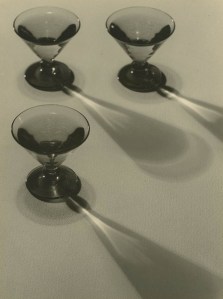 hunger and satisfaction, are all found within the bounds of this sardonic, ironic, and indeed tragic triangle.
hunger and satisfaction, are all found within the bounds of this sardonic, ironic, and indeed tragic triangle.
Julia tells Helen“Kay wants a wife, you see…. She wants a wife – someone good, I mean someone kind, untarnished. Someone to keep things in order for her, things in place.…. And elsewhere. “Kay wants a wife: she always has…… one must be the wife with Kay or nothing.”
Julia’s tragedy is that she does not in the least resemble a wife, and could never be one in the conventional sense. Perhaps this is the reason for her bitterness. Julia is correct when she characterises Kay as ‘a gentleman’, and it is this quality which makes Helen so ‘other’ to her, creating the sexual polarity, as well as the incomprehension which is at the base of a certain kind of lesbian relationship. Kay’s particular mix of gender chemistry puts her at the opposite end of the lesbian continuum from Helen, and far enough from Julia to spark an attraction, whereas for Julia there does not appear to be a similar dynamic with Helen. There is for some of us a peculiar and potent chemistry of the upper-class British butch lesbian of a certain era: that marvellous admixture of gender indeterminacy and incorruptible propriety that is personified in Kay. There is an superiority in that which Julia would undoubtedly be able to appreciate, and it is very likely to have been at the root of her attraction to Kay. Julia admits to Helen that she had loved Kay. She does not appear to have loved anyone else. Julia and Kay would have suited each other perfectly, but for that little glitch – an insufficiency of the polarity required by Kay: and all for the want of a horse-shoe nail.
The accidental attractants we call chemistry which lead to couplings are just fuses that connect to the bomb, and when we light the match we have  to not let ourselves know what we are doing. And so we wonder how Kay might have tolerated Helen’s capriciousness, her lack of refinement. Was it sufficient that Helen’s merely corresponding to Kay’s image of what a wife could be, would seem like it might have sufficed? Did the rescue from the rubble create a script which played straight to the heart of Kay’s sense of knight-errantry? That Julia has forsaken the contextual associations of her class, more than anything else, makes her seem to have rejected her inherited moorings. It seems she has rejected them because she was rejected by Kay. I don’t know if Americans relate very well to this understated but very unshakable code of behaviour and character, and in fact ethics. Kay’s self-deprecating nobility, her conspicuous bravery, her untainted sense of honour, her gallantry towards women, her inexhaustible generosity, so heretical in the the face of fervent belief in mere survival, is what makes her so admirable. This constellation of traits is all the more remarkable because of her extreme emotional fragility.
to not let ourselves know what we are doing. And so we wonder how Kay might have tolerated Helen’s capriciousness, her lack of refinement. Was it sufficient that Helen’s merely corresponding to Kay’s image of what a wife could be, would seem like it might have sufficed? Did the rescue from the rubble create a script which played straight to the heart of Kay’s sense of knight-errantry? That Julia has forsaken the contextual associations of her class, more than anything else, makes her seem to have rejected her inherited moorings. It seems she has rejected them because she was rejected by Kay. I don’t know if Americans relate very well to this understated but very unshakable code of behaviour and character, and in fact ethics. Kay’s self-deprecating nobility, her conspicuous bravery, her untainted sense of honour, her gallantry towards women, her inexhaustible generosity, so heretical in the the face of fervent belief in mere survival, is what makes her so admirable. This constellation of traits is all the more remarkable because of her extreme emotional fragility.
Kay’s loss of Helen does not adequately explain the depth and extent of her grief and devastation, her sense of unbelievable desolation and how completely undone she is: the unrelenting and insuperable sense of doom and brokenness beyond all fixing that clings to her like a shadow. Helen is really no great shakes. She is too wounded and insecure herself to do anyone any good. She is driven to hide her attraction to women, and is paranoid about public displays of affection. She is unstable and shallow and immature. Even so, for  Kay, such a ‘wife’ as Helen was might well have provided the perfect antidote for her insubstantiality. Women like Kay need such an anchor to keep them from drifting off into the vast uncharted expanses of their lonely interior oceans. The world becomes for them a featureless place, except for its patches of shifting darkness, and there is no torment quite like being trapped in such an existence. Though her values were far from bourgeois, her domestic expectations were beautifully conventional. Perhaps the absence of family in her life may have something to do with this. What was needed for the healing of Kay’s wounds was a stable, untroubled domesticity, but some irony of fate makes of her a ‘Samson Agonistes’ with perfect public school politesse.
Kay, such a ‘wife’ as Helen was might well have provided the perfect antidote for her insubstantiality. Women like Kay need such an anchor to keep them from drifting off into the vast uncharted expanses of their lonely interior oceans. The world becomes for them a featureless place, except for its patches of shifting darkness, and there is no torment quite like being trapped in such an existence. Though her values were far from bourgeois, her domestic expectations were beautifully conventional. Perhaps the absence of family in her life may have something to do with this. What was needed for the healing of Kay’s wounds was a stable, untroubled domesticity, but some irony of fate makes of her a ‘Samson Agonistes’ with perfect public school politesse.
The world of the London Blitz and the black-out was a world of almost primordial darkness, a world without street-signs, and of obliterated landmarks. Its inhabitants were cut loose from their accustomed moorings in the past ‘normalcy’, and order was something which had to be imposed by acts of will and ingenuity. This material darkness has its counterpart in another which can extend into the soul as insidiously as an invading mould. While Kay is intrepid in the manner in which she faces the outer darkness, she seems to have avoided a descent into her own inner darkness. Kay gives definition to an existential version of our fear of the dark: it is not a monster lurking under the bed or a vampire who comes flying in at night through a window that has carelessly been left open. These fears in us may be faced with an effort of reason and commonsense, but it is not quite as easy to dismiss the abysmal fear of the unrelievable isolation to be found when one confronts the truth about the human condition. The unforgettable lines with which Dante began The Inferno exactly describe Kay’s predicament: “In the middle of the journey of our life, I found myself in a dark wood, where the right way was lost. Oh how to speak of it, it was a thing so severe, that savage wood, and strong and harsh, the thought of it renews my fear, so bitter did it seem that death could scarce be more.”
renews my fear, so bitter did it seem that death could scarce be more.”
The purpose and courage with which both Kay and Julia responded to the high degree of danger in their jobs, suggests they were at once resisting and succumbing to the same cause with a similar effect. Danger gives them a kind of focus, and each of them faces a different but equally significant encounter with devastation in the performance of her duties. It is an enormous irony that the Kay/Julia relationship did not work out, because they are a match in depth, and both of them are much deeper than Helen could ever be. They possess a more complex capacity for life experience and for confronting and adapting to its exigencies with a touch of graceful irony. But they belong to a class of women who are not whole in themselves. Though the absence of love clearly outlined its negative space in Julia’s life, she was able to face and accept it, whereas Kay attempted to fill the space imperfectly. It seems ironic that Julia, who speaks with apparent dismissiveness about Kay being a ‘sentimentalist’ and a ‘gentleman’, could have been in love with her, but then, 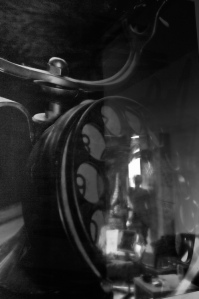 Julia always seemed able to downplay her emotions and take her medicine straight.
Julia always seemed able to downplay her emotions and take her medicine straight.
So little about why anyone falls in love is visible to anyone else on the outside of the experience. The real causes and effects, and reasons, all unfold on the inside. When Kay, on one of her nightly ambulance runs, rescues Helen out of the rubble of a recently fallen bomb, the biggest shock is finding that she is still alive, and miraculously unhurt. This is probably the moment when Kay begins to fall in love. Why this could be we may infer, but never know for certain. We sense this is a moment in life when what happens in the material world imprints itself on us in such a way as to alter the inner mechanism of perception. The moment when Kay finds the still-living and improbably intact Helen partially encased in a tomb of crumbled brick and plaster, might be just such a moment when the element of shock and joy wipes the mind clean of present awareness and replaces it with something enormously new and strange, and the rescuer and the rescued emerge from the immediate past in a mutual silence and reenter the world together. There was another Helen, who was born from an egg, whose adulterous love brought ruin to all around her. But Kay was probably not thinking about that.
There is in Helen, for all her ability to go after what she wants, something of “a second-former swooning over a prefect”, a degree of immaturity, of heedlessness and impulsivity. She is so gripped by her passion for Julia that she cannot deduce on the basis of their characters, what might have transpired to end the relationship between Kay and Julia. The clues are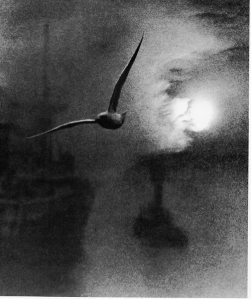 all there in Kay’s nature, and Julia’s repeated mentions about Kay’s insistence of having a ‘wife’ and Julia’s repeated demonstrations that she would not fit that role. This should have made Helen pause and give the matter some thought. But Helen’s desire was really an insatiable hunger to devour the hidden parts which Julia might have previously ceded to Kay: parts which were given but refused. Helen wanted what she could never have. When it came down to it, Kay’s gallantry and refinement played just as badly to Helen’s romantic needs as did Julia’s glamour, which came packaged together with her aloof indifference.
all there in Kay’s nature, and Julia’s repeated mentions about Kay’s insistence of having a ‘wife’ and Julia’s repeated demonstrations that she would not fit that role. This should have made Helen pause and give the matter some thought. But Helen’s desire was really an insatiable hunger to devour the hidden parts which Julia might have previously ceded to Kay: parts which were given but refused. Helen wanted what she could never have. When it came down to it, Kay’s gallantry and refinement played just as badly to Helen’s romantic needs as did Julia’s glamour, which came packaged together with her aloof indifference.
These three women are, in different ways, incomprehensible to each other, but any woman she loves it seems, will always be an unsolved mystery to Kay. This weakness, this inability to understand the way in which, as well as whom, she loves, is always likely to come between her and her happiness. The reason for this disconnect becomes slightly more clear when we set aside our identification of Kay as a woman and lesbian when in fact, more than either of these designations of gender, she more accurately conforms to an older and now dismissed concept – Radclyffe Hall’s The Well of Loneliness definition of the invert. Kay, (who by my calculation was born in 1910) would have been 18 when Hall’s book was published. She might have seen herself as a sort of Steven Gordon, a person at odds with the world, and one who could not be made to fit in it. That was a perception that may have undergone some modification in the danger and uncertainty of the Blitz, but which could not be altered at a more fundamental level.
The fascination we have with novels about broken and damaged people comes from being shown in a vivid and inescapable way the specific parts of the human machine which have broken down and ceased to function because they have been smashed against the unyielding surface of the world. Through such novels, and in the reflection of their characters, we are able to take a tentative scalpel to our own psyches and check our  own working and non-working parts, in an attempt to either reassure or terrify ourselves with questions about our own soundness – or the lack of it. Such novels are themselves like incendiary bombs, burning directly downwards as if with the able collusion of gravity, through time, unstoppably and with a sinister purpose.
own working and non-working parts, in an attempt to either reassure or terrify ourselves with questions about our own soundness – or the lack of it. Such novels are themselves like incendiary bombs, burning directly downwards as if with the able collusion of gravity, through time, unstoppably and with a sinister purpose.
The mood in which I read The Night Watch had been set when my ear caught and held a subtle note of weariness in its lucid, beautifully ordinary language, innocent of all rhetorical flourishes and artifice. It is of course the weariness of wartime, the unrelenting and insuperable sense of doom and brokenness, beyond all fixing, the nightly danger posed by bombs and fires and collapsing buildings, the cheerless, inedible food, the vitiated air, the predominant shabbiness of everything, the scarcity or even absence of hot water. Language itself must be pruned where there is no excess energy to be squandered. An economy of words takes hold when economy prevails in all else. But Waters’ economy is deceptive, and it deceived me, and its perfect balance, so poised between skillfully arranged complexity and intuition, defeated the part of my brain dedicated to critical analysis and caused it to recede and disappear. I was forced to surrender to the sense that I was playing blind-man’s buff in an unlit room. This, I think, is due to the unique fashion in which time is represented in this novel, and not just that the arrow is flying backwards. Waters’ inclination is to reveal without confiding, and to delineate detail by vivid detail, such as the small but ominous symbols which signal a seismic shift. On Helen’s birthday,Kay takes enormous care over the presents: an extravagant and exquisite pair of pearl-coloured satin pyjamas bought on the black-market, an orange carefully pricked over with ‘Happy Birthday’, coffee…. but while Helen rather uneasily accepts these tokens of love, she rebuffs all Kay’s gestures of tender affection. Helen’s irritability, the absence of warmth, her aversion to Kay’s touch, all signal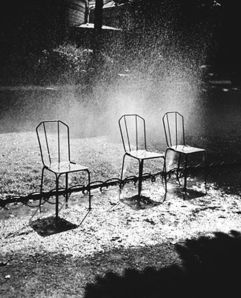 the retreat and withdrawal of love. It is reminiscent of a scene in an old movie version of Dracula, when a crack appears and rapidly spreads on the surface of the castle courtyard. It presages the presence of the vampire, and one cannot interpret it as anything but a sign of impending disaster.
the retreat and withdrawal of love. It is reminiscent of a scene in an old movie version of Dracula, when a crack appears and rapidly spreads on the surface of the castle courtyard. It presages the presence of the vampire, and one cannot interpret it as anything but a sign of impending disaster.
The withholding of information is a device vital to carrying a plot forward. It creates suspense, and gives the reader an active role in solving a riddle. But when a novel proceeds in an opposite trajectory to the arrow of time, how can a writer create suspense with the ending already revealed on the very first page? Waters does it from the first instant, by counting on the reader’s inexperience with such a reversal, and his or her failure to grasp its significance. We enter the novel stumbling in a moment of blindness and it takes a while to begin to get oriented. I felt I was forced by Waters to care deeply about Kay in this instant of disorientation and confusion, but along with that confusion was implanted the desire to dispel and resolve it.
Waters maintained her unique purpose of temporal distortion by not permitting her characters to recall their pasts. It is not that they had amnesia, but they could not dwell on what had brought them to the present. They could stand at the river side and gaze at the opposite bank, they had to avert their gaze from the bridge, nor could they walk across it. But The Night Watch is itself a backward glance though the characters are never permitted to recall 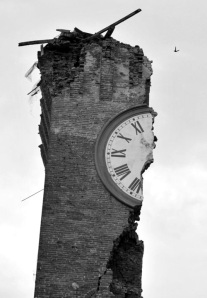 and remember. Kay, like Orpheus, walks through the underworld with the faint echo of footsteps in her wake, but when she emerges it is not into sunlight, but into unutterable bleakness. Because the narrative recedes in time, each segment of the present is as clearly crystallised in its place as an egg in aspic. The implications of this literary device are not noticeable at first, but its consequence, the absence of past memory in the minds of the characters, creates a sense of inexplicable unease. The past is there, but it is locked fast in the future. That in itself creates a sense of helpless imbalance in the mind of the reader, which taken together with the immediate, preternaturally detailed ordinariness of the narrative, persistently denies a handhold or a foothold on its surface. Readers often sense it when information is being gratuitously withheld, but even though Waters had tied one hand behind her back when she made the rules, it was worth it, because it worked.
and remember. Kay, like Orpheus, walks through the underworld with the faint echo of footsteps in her wake, but when she emerges it is not into sunlight, but into unutterable bleakness. Because the narrative recedes in time, each segment of the present is as clearly crystallised in its place as an egg in aspic. The implications of this literary device are not noticeable at first, but its consequence, the absence of past memory in the minds of the characters, creates a sense of inexplicable unease. The past is there, but it is locked fast in the future. That in itself creates a sense of helpless imbalance in the mind of the reader, which taken together with the immediate, preternaturally detailed ordinariness of the narrative, persistently denies a handhold or a foothold on its surface. Readers often sense it when information is being gratuitously withheld, but even though Waters had tied one hand behind her back when she made the rules, it was worth it, because it worked.
Distortions in the sequencing of time are inherently confusing to a reader. A still more subtle way in which Waters manipulates time, is the accretion of detail itself – one simply does not catch that much detail in a state of normal awareness. This device distorts the perception of time by altering the speed at which time travels to something resembling slow-motion. But fortunately for us, the ‘past’ of the narrative is always consistently present in some form or another. We cannot reclaim the past in order to fill in the gaps Waters is compelled to create in the story, but neither are we exactly removed from it, because its hold on us is never entirely absent: it never leaves us entirely alone with the present: its intrusions never cease. It did occur to me that the remedy might be to read the book backwards, or to tear it into its segments and separate the pages within each segment and rearrange them in a different order, but I was prevented by a powerful taboo in me having to do with the destruction of books.
In a sense, The Night Watch is a study of unwholesome relationships and decadence lurking beneath the smudgy ordinariness anxious to disguise  and deny it. The absence of love is starkly delineated throughout. The mass of sensuous detail relentlessly adumbrates and underscores the feeling of decay both within and without the characters. Still there are almost Zen-like moments, as when a flash of irrepressible beauty intrudes and Waters’ prose simply takes flight. The fox encountered by Julia and Helen on a walk through the bombed-out streets at night, when “they watched it dart, as quick and fluid as racing water” and the distant sound of a band “swelling and sinking on impalpable gusts of air, like washing on a line”, evoke by a few deft, suggestive strokes an almost unearthly beauty. In the immediacy of this writing, our nostrils are filled with the odour of burning feathers, when a pigeon, its wings on fire flies through the darkness in the aftermath of a bomb, a rabbit-meat sandwich is described as being ‘sweet’, we almost see the aged ruin of a ninety-year-old woman in a yellow nightgown, sleeping in her bed in her bomb-damaged house, and the school girl joke I remember about the top hat and the bra (still in currency when I was in First Form.) But occasionally and unexpectedly, the detail seems false, as when the voice of the woman in the basement apartment resembles ‘gnat-like whining’ as it insinuates itself through the floor. Do gnats really whine, or are they are a quiet race of creatures who go about their gnat-like business in total silence? And did people in war time Britain say “wow”? Did they ‘press’ rather than ‘iron’ their clothes?
and deny it. The absence of love is starkly delineated throughout. The mass of sensuous detail relentlessly adumbrates and underscores the feeling of decay both within and without the characters. Still there are almost Zen-like moments, as when a flash of irrepressible beauty intrudes and Waters’ prose simply takes flight. The fox encountered by Julia and Helen on a walk through the bombed-out streets at night, when “they watched it dart, as quick and fluid as racing water” and the distant sound of a band “swelling and sinking on impalpable gusts of air, like washing on a line”, evoke by a few deft, suggestive strokes an almost unearthly beauty. In the immediacy of this writing, our nostrils are filled with the odour of burning feathers, when a pigeon, its wings on fire flies through the darkness in the aftermath of a bomb, a rabbit-meat sandwich is described as being ‘sweet’, we almost see the aged ruin of a ninety-year-old woman in a yellow nightgown, sleeping in her bed in her bomb-damaged house, and the school girl joke I remember about the top hat and the bra (still in currency when I was in First Form.) But occasionally and unexpectedly, the detail seems false, as when the voice of the woman in the basement apartment resembles ‘gnat-like whining’ as it insinuates itself through the floor. Do gnats really whine, or are they are a quiet race of creatures who go about their gnat-like business in total silence? And did people in war time Britain say “wow”? Did they ‘press’ rather than ‘iron’ their clothes?
 Both World Wars, but more dramatically the second, caused the collapse in England of the old social contact between men and women. The lull of 22 years which lasted between the first and second wars, was still a time during which the frayed fabric of the old social order refused to give way completely. A few strong threads of former entrenched restrictions on the freedom of women to act, to be independent and autonomous, continued to hold. But both wars afforded unexpected new opportunities to women of a certain metal and calibre. During both wars, lesbians took to the new conditions with immense alacrity and purpose, and chaos itself became the climate in which these freedoms were enthusiastically embraced by women who carried their latent heroism within them like a recessive gene. Chaos and danger were exactly the conditions they needed to come into their own.
Both World Wars, but more dramatically the second, caused the collapse in England of the old social contact between men and women. The lull of 22 years which lasted between the first and second wars, was still a time during which the frayed fabric of the old social order refused to give way completely. A few strong threads of former entrenched restrictions on the freedom of women to act, to be independent and autonomous, continued to hold. But both wars afforded unexpected new opportunities to women of a certain metal and calibre. During both wars, lesbians took to the new conditions with immense alacrity and purpose, and chaos itself became the climate in which these freedoms were enthusiastically embraced by women who carried their latent heroism within them like a recessive gene. Chaos and danger were exactly the conditions they needed to come into their own.
The Night Watch has an earlier ancestor in a short story entitled “Miss Ogilvy Finds Herself”, written by Radclyffe Hall about two weeks before The Well of Loneliness. Hall has always (somewhat unjustly in my view) been derided by her literary peers – or at least contemporaries – such as Virginia Woolf, for her flights of undisciplined and sentimental excesses, but her significance for me is not related to her writing, but to her successful effort to end lesbian invisibility. Her highly-charged, and yes, overwrought short story is about a woman who was the head of a French ambulance service in WWI. After the armistice, Miss Ogilvy’s unit is demobilised, her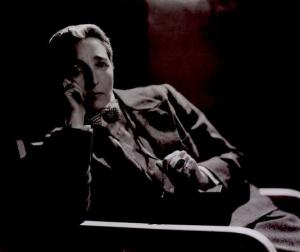 world dismantled, and her place within it effaced with a total and irreversible finality. The Red Cross Ambulance Brigade in Calais, France, and the vehicles she so competently ‘manned’, are lost to her forever. There will be no longer any scope for her bravery and gallantry. The qualities she so conspicuously possessed as the natural inheritance of her specific gender, as well as her sacrifice, are forgotten when she comes back to England alone and without a purpose to her life. She was used, and discarded when she was no longer needed, and in the aftermath of this rejection her mind unravels in its effort to reestablish itself in a way which would accommodate its intrinsic wholeness. In order to find herself, the ‘invert’ Miss Ogilvy has to bypass recorded history and all traces of civilisation to enter a time in prehistory and recreate her shattered psyche as a man in the Neolithic era, but even there, she cannot imagine that a durable happiness could be within her grasp.
world dismantled, and her place within it effaced with a total and irreversible finality. The Red Cross Ambulance Brigade in Calais, France, and the vehicles she so competently ‘manned’, are lost to her forever. There will be no longer any scope for her bravery and gallantry. The qualities she so conspicuously possessed as the natural inheritance of her specific gender, as well as her sacrifice, are forgotten when she comes back to England alone and without a purpose to her life. She was used, and discarded when she was no longer needed, and in the aftermath of this rejection her mind unravels in its effort to reestablish itself in a way which would accommodate its intrinsic wholeness. In order to find herself, the ‘invert’ Miss Ogilvy has to bypass recorded history and all traces of civilisation to enter a time in prehistory and recreate her shattered psyche as a man in the Neolithic era, but even there, she cannot imagine that a durable happiness could be within her grasp.
In my mind, crop-headed Miss Ogilvy is in a very real sense Kay Langrish’s lesbian ancestor, and their post-war lives seem to me to be echoes of each other. Like Miss Ogilvy’s in WWI. Kay’s deracinated existence in a shattered and exhausted post-war London is merely the encompassing reverberation of her far greater psychic devastation. And a similar devastation to what appears in Radclyffe Hall’s short story lies at the heart of The Night Watch. The inescapable  dreariness of life to which Kay gives herself over in resignation and mute surrender seems very much like the conditions faced by Miss. Ogilvy in the loss of a world in which she had temporarily fit. These two things together, the loss of that world, and the meaning it gave to a life, in their perfect synchronicity amplified the wave of ruin to such a degree that nothing else could be audible above their sound.
dreariness of life to which Kay gives herself over in resignation and mute surrender seems very much like the conditions faced by Miss. Ogilvy in the loss of a world in which she had temporarily fit. These two things together, the loss of that world, and the meaning it gave to a life, in their perfect synchronicity amplified the wave of ruin to such a degree that nothing else could be audible above their sound.
It is a great tribute to Waters’ skill that her narrative ellipses tend to go unnoticed in the spell cast by the plethora of atmospheric detail. We are never shown how Kay’s break up with Helen unfolded, though we may deduce that the denouement took place on the night a bomb hit Kay’s flat in Pym’s Yard. Waters sets the scene and glosses over the details, and we get only the briefest glimpse of Kay and Julia unexpectedly appearing together out of the darkness. When Kay’s relief that Helen has survived the bomb blast had slightly subsided, and she recovered herself sufficiently in order for her rational mind to reassert itself, we may suppose that she realised the reason for Helen’s escape was that she was away from her own home, and had spent the night with Julia. The happy ending is sometimes just a heightened irony in disguise, a fine coat which may easily be turned inside-out to reveal its shredded lining. One moment we share Kay’s desolation at the thought of Helen being killed when their flat was hit by a bomb, and next we share her sigh of relief at the sight of Helen returning to her home with Julia. A few pages later we are back at the beginning, with Kay as she sees Helen for the first time, trapped in the rubble in the aftermath of a bomb and so we come full circle with the beginning and the end of an affair. Waters teases and disconcerts by waving in front of us an ending of the novel, which for a moment we confuse with the ending of her story, but no sooner have we read it than we realise this is only the beginning of what was to be a tragic ending. It strikes us like the bombs Kay’s friend Micky tells us landed in a cemetery and burst open the graves, shattering the coffins.
have we read it than we realise this is only the beginning of what was to be a tragic ending. It strikes us like the bombs Kay’s friend Micky tells us landed in a cemetery and burst open the graves, shattering the coffins.
The manner in which Waters creates a ghostly echo of her novel in a reader’s mind is something which has a durable power to fascinate me. Meaningful stories for me are those that don’t just end at a literary stopping point which sometimes seems both inevitable and arbitrary, but then keep on going. They can move backwards and forwards in time, into our present thoughts, but also into the echoes that already existed before the book was read. The stories proceed in an out-of-sync disjunction like a solid universe emerging out of the ineffable and in time transforming into a swarm of massless photons which rush headlong into darkness. We are compelled as readers to inhabit the strange space of the writer’s mind  and submit to its its inexplicable laws. It is this contract that leads us by the hand and compels us to live lives which are not ours, but which nonetheless resound with a startling echo, so that they may as well be ours.
and submit to its its inexplicable laws. It is this contract that leads us by the hand and compels us to live lives which are not ours, but which nonetheless resound with a startling echo, so that they may as well be ours.
In delving into the manner in which Waters constructed her novel, I remembered that one of my very favourite books, ever since I read it decades ago, has been Edward Abbots’s Flatland.Though I didn’t know it at the time, it taught me to think in a completely different way. The way in which a book represents itself to me has always been at the foundation of how I perceive it, understand it and remember it. Abbot’s superbly written gem, a treatise on dimensions and how we perceive them, has come to deeply inform my understanding of what I read. Life happens in three dimensions, four if you count time, though this, being a temporal dimension, is quite different from the other three, which are spatial. Books, which are not strictly speaking life, have to represent the dimensions of life in a way which admits that hidden dimension. We learned as children how this could be done with three dimensional object such as a cube. A cube has parallel sides and perpendicular angles, but when we represent a cube in two dimensions, its missing dimension can be revealed, but only if we use additional angles besides right angles. We have to off-set opposite surfaces by drawing two overlapping squares, and then joining their corners in ways that do not exist in the original cube. The additional ‘dimension’, time, which gives an object its reference in ‘reality’, is really a very secret player, and one which has to be handled carefully and creatively if life, which is the object we are 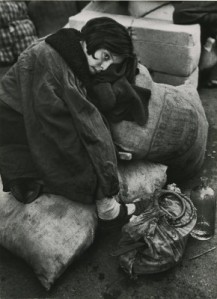 attempting to pin down in a novel, is to be convincingly conveyed. The cube drawn on a sheet of paper overrides our knowledge about what cubes really are, but nonetheless it leads us to correctly identify an image as a cube with a missing dimension. Without the ‘false’ angles we are unable to see the cube. The illusion must be created in accordance with the rules of perception, and this requires a brilliant imagination. In order to make use of the referential nature of time in her narrative without actually unravelling it, Waters has to make a casualty of memory. When done correctly in a novel or a story, the hidden and absent dimensions of life erupt on the page. Luckily for us, we are able to manipulate time in this way as well. And time is often the key to the way in which the characters in a novel make their secret way off the page and into our minds.
attempting to pin down in a novel, is to be convincingly conveyed. The cube drawn on a sheet of paper overrides our knowledge about what cubes really are, but nonetheless it leads us to correctly identify an image as a cube with a missing dimension. Without the ‘false’ angles we are unable to see the cube. The illusion must be created in accordance with the rules of perception, and this requires a brilliant imagination. In order to make use of the referential nature of time in her narrative without actually unravelling it, Waters has to make a casualty of memory. When done correctly in a novel or a story, the hidden and absent dimensions of life erupt on the page. Luckily for us, we are able to manipulate time in this way as well. And time is often the key to the way in which the characters in a novel make their secret way off the page and into our minds.
Another thought that lingered after I read The Night Watch was to wonder why lesbian writers don’t write more lesbian novels. Waters has paid her dues, so to speak, with two well-written and unabashedly concupiscent lesbian novels, Tipping the Velvet and Fingersmith, and flirted with a character of ‘lesbian sensibility’ in Affinity. Fingersmith and Tipping the Velvet most probably had lesbians rushing book-store counters in droves, but with The Night Watch Waters made her unfaltering way into the middle of main stream fiction. The Night Watch may or may not be a lesbian novel, but the lesbian content in it was the centrepiece for me, and I rather think it was intended as such. I will not hold it against Waters if she never  creates another lesbian character. I think I understand why lesbian writers don’t go on writing lesbian books: perhaps they get tired of the subject, or perhaps it exhausts itself for them, or perhaps they feel they might not want to go on writing the same book under a different cover. What I don’t understand is how heterosexual writers go on writing heterosexual books without ever seeming to run out of heterosexual material or tiring of heterosexual themes and subjects. Is this because a largely heterosexual reading public demands, and will pay for, an endless stream of fiction to which they can ‘relate’ and which caters to their particular literary needs? Or is it perhaps because there are more heterosexuals who want to read about other heterosexuals than there are either lesbians and gays or heterosexuals who want to read about homosexuals? It is a vexing question and one without an immediate answer.
creates another lesbian character. I think I understand why lesbian writers don’t go on writing lesbian books: perhaps they get tired of the subject, or perhaps it exhausts itself for them, or perhaps they feel they might not want to go on writing the same book under a different cover. What I don’t understand is how heterosexual writers go on writing heterosexual books without ever seeming to run out of heterosexual material or tiring of heterosexual themes and subjects. Is this because a largely heterosexual reading public demands, and will pay for, an endless stream of fiction to which they can ‘relate’ and which caters to their particular literary needs? Or is it perhaps because there are more heterosexuals who want to read about other heterosexuals than there are either lesbians and gays or heterosexuals who want to read about homosexuals? It is a vexing question and one without an immediate answer.
In the almost-historical past, the publishers of lesbian novels required that stories about lesbians end in disaster. The scripts demanded that lesbian characters had to see the error of their ways and acknowledge the superiority of heterosexual relationships, go mad, lose the girl, commit suicide or be murdered. No matter how sophisticated a reader was, and no matter how well she understood the reasons why this had to be so either from a literary or censorship requirement, the residue of hopelessness tended to linger. There were of course a few notable exceptions. I congratulate the late, great Jane Rule for her focus on lesbian subject matter. We need the Jane Rules of the world, and it is our misfortune that there could only ever be one of her. I don’t fault Patricia Highsmith for her one-off, The Price of Salt, the first lesbian novel with a happy ending, because it was a huge landmark for its time, (1952) and will continue always to be regarded as such. But I do wish there were more well-written lesbian novels by writers who are capable of taking on the subject truthfully and competently. I wish I could find more novels in which lesbians are primary and not secondary characters, and which do not end in the way the tradition has required of them for so many years. Waters has done it before, and one hopes perhaps she might do it again.
landmark for its time, (1952) and will continue always to be regarded as such. But I do wish there were more well-written lesbian novels by writers who are capable of taking on the subject truthfully and competently. I wish I could find more novels in which lesbians are primary and not secondary characters, and which do not end in the way the tradition has required of them for so many years. Waters has done it before, and one hopes perhaps she might do it again.
I don’t like much to think of psychology outside the reliable framework of a literary or operatic context, and as I got to the end of my own erratic progress through this rambling analysis, it suddenly came to me that Kay was, above all, a Faustian figure, but only as in Berlioz’s opera La Damnation de Faust and not as in Goethe’s original. Berlioz, I think, is more hopeful and optimistic, and if one wishes for a psychological connection, his work could well be seen as a prefiguring of Jung. Kay’s entrance at the beginning of the novel echoes the 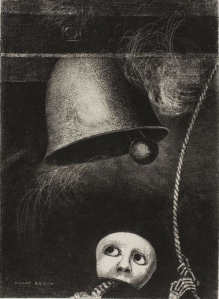 Faustian predicament, the alienation from the world, the failed search, the moment of despair, and of being on the verge of disintegration. The recapitulation of the events leading to this moment in Kay’s life, her dedicated search for fulfillment and the contract required in order to achieve it, runs parallel to Faust’s journey. Alas, the first Marguarete was false, and the true Marguarete is nowhere in sight, but where we find Faust and Mephistopheles she cannot be far off, and is fated to appear. What is now needed to set the inevitable in motion is merely the sound of the Easter Bells. We fervently hope that one day soon, when Kay is standing at her window, or when she is on one of her solitary walks through the city, or just watching a movie in the darkness of a cinema, she will hear them ring out loudly, clearly and unmistakably.
Faustian predicament, the alienation from the world, the failed search, the moment of despair, and of being on the verge of disintegration. The recapitulation of the events leading to this moment in Kay’s life, her dedicated search for fulfillment and the contract required in order to achieve it, runs parallel to Faust’s journey. Alas, the first Marguarete was false, and the true Marguarete is nowhere in sight, but where we find Faust and Mephistopheles she cannot be far off, and is fated to appear. What is now needed to set the inevitable in motion is merely the sound of the Easter Bells. We fervently hope that one day soon, when Kay is standing at her window, or when she is on one of her solitary walks through the city, or just watching a movie in the darkness of a cinema, she will hear them ring out loudly, clearly and unmistakably.





















































































































































